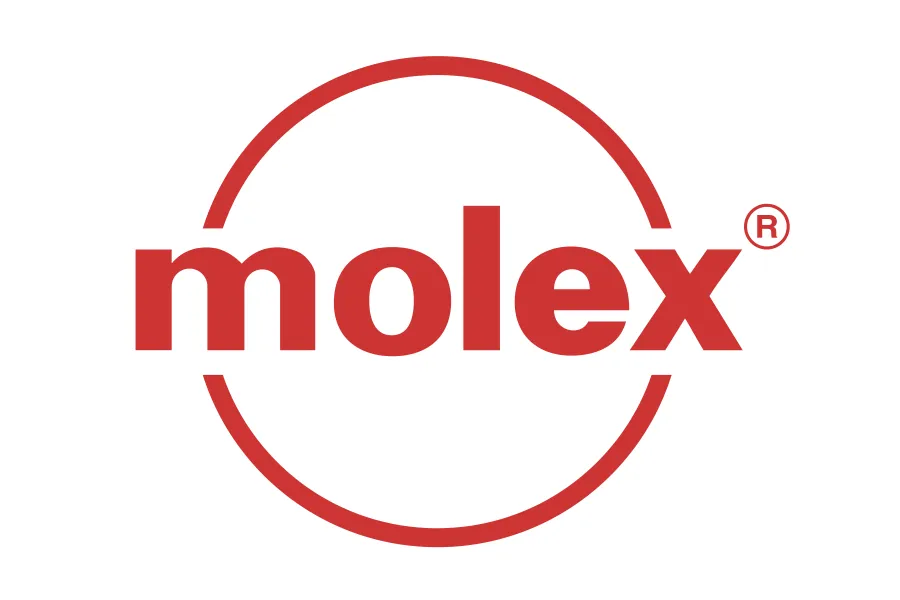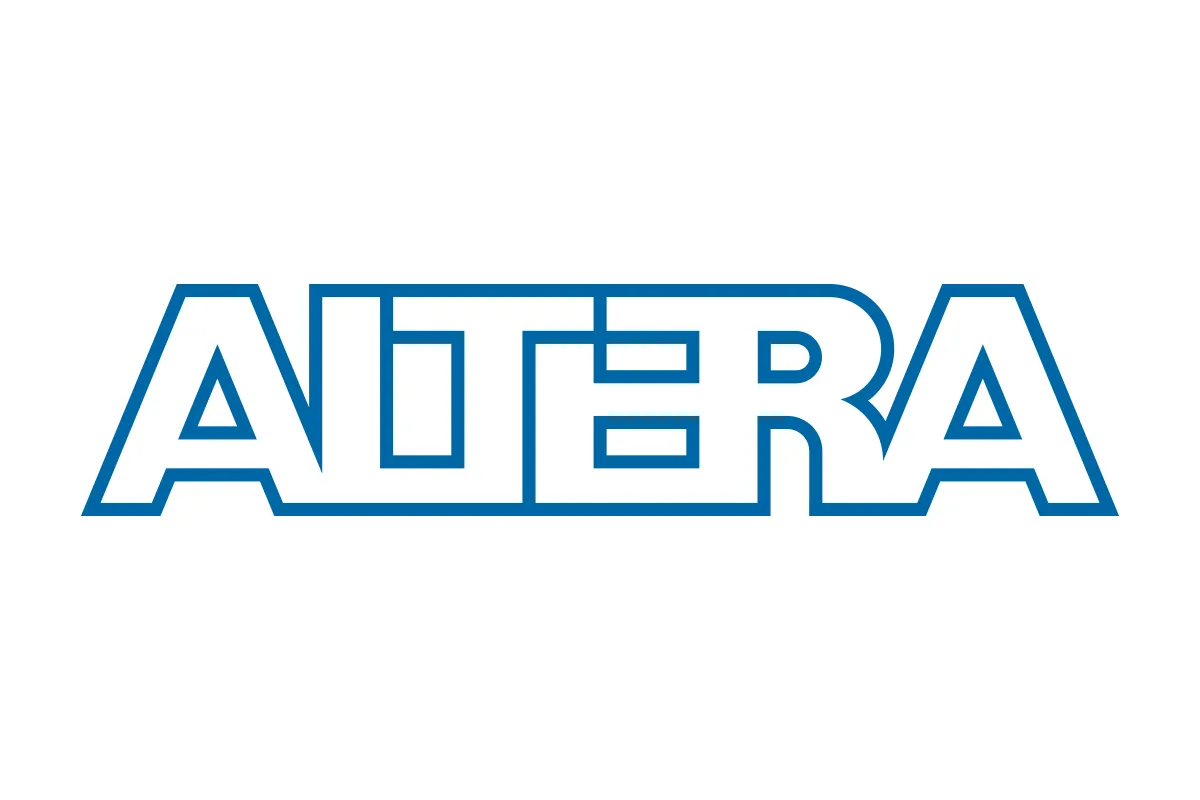Capacitors serve as fundamental components in electronic circuits, storing and releasing electrical energy as needed. Despite their importance, capacitors are susceptible to various failure modes that can compromise circuit performance and reliability.
In this comprehensive guide, we will explore why do capacitors fail, the reasons behind capacitor failures, the different types of failures, the symptoms of failures, and strategies to prevent such failures.
Why Capacitor is Used?
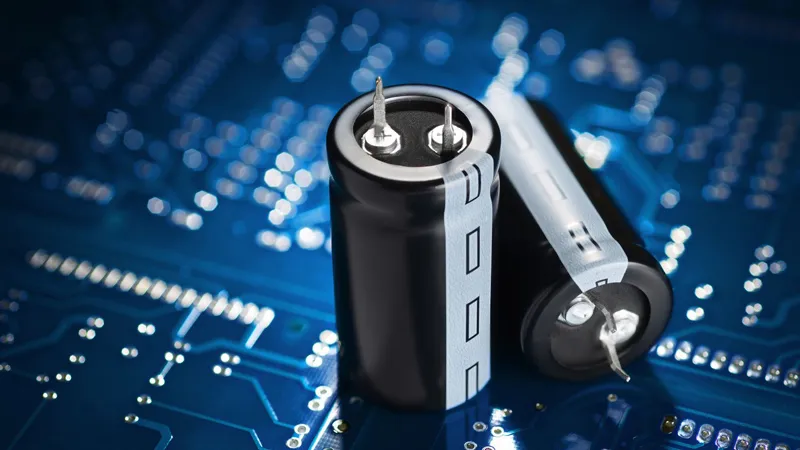
Capacitors are used in electronic circuits for a variety of reasons, each stemming from their unique electrical properties and functionality. Here are the primary reasons why capacitors are essential components in electronic systems:
- Energy Storage: One of the fundamental purposes of capacitors is to store electrical energy temporarily. When a voltage is applied across a capacitor, it stores energy in an electric field between its plates. This stored energy can be released back into the circuit when needed, making capacitors crucial for buffering and stabilizing power supplies, especially in applications with fluctuating power demands.
- Filtering and Smoothing: Capacitors are effective in filtering out noise, unwanted signals, and high-frequency components from electrical signals. By acting as low-pass or high-pass filters, capacitors can smooth out voltage ripples in power supplies, reduce electromagnetic interference (EMI), and improve signal quality in audio and communication systems.
- Timing and Delay: Capacitors, in conjunction with resistors, can create timing circuits such as RC (resistor-capacitor) circuits. These circuits control the timing of events, such as the charging and discharging of capacitors, which is utilized in applications like time delays, oscillators, and pulse generation.
- Coupling and Decoupling: Capacitors are used for coupling or connecting different parts of a circuit while blocking direct current (DC). This allows AC (alternating current) signals to pass while isolating DC components. Capacitors also serve as decoupling elements to prevent noise or disturbances from propagating between circuit sections, ensuring signal integrity and stability.
- Voltage Regulation: In voltage regulation circuits, capacitors assist in maintaining stable voltage levels by compensating for voltage fluctuations or sudden changes in load. They can provide transient voltage support during power surges or dips, enhancing the overall reliability of electronic devices.
- Signal Processing: Capacitors play a crucial role in analog signal processing, including signal coupling, amplification, and differentiation. They help shape and modify signals in amplifiers, filters, and sensor interfaces, contributing to accurate signal transmission and processing.
- Motor Start and Run: In electrical motors, capacitors are often used for starting and running operations. Start capacitors provide the initial torque needed to start the motor, while run capacitors help maintain consistent motor performance during operation, improving efficiency and reducing power consumption.
- Lighting Applications: Capacitors are integral components in lighting systems, including fluorescent lamps, LEDs, and HID (high-intensity discharge) lamps. They assist in power factor correction, voltage stabilization, and providing initial current surges required for lamp ignition and operation.
- Memory and Storage: Certain types of capacitors, such as dynamic random-access memory (DRAM) capacitors in computer systems, are used for temporary data storage. Capacitors in memory modules store binary data as electrical charges, allowing rapid access and retrieval of information in digital devices.
Why Do Capacitors Fail?
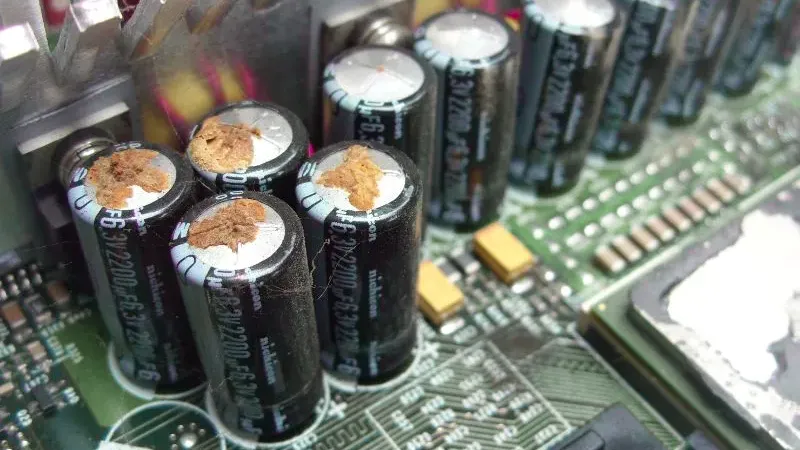
Capacitors can fail due to various factors, ranging from environmental conditions to electrical stresses and manufacturing defects.
Overvoltage and Overcurrent: Exceeding the rated voltage or current limits of a capacitor can lead to its failure. Overvoltage can cause a dielectric breakdown, insulation failure, and internal arcing, while overcurrent can result in excessive heating, internal damage, and reduced capacitance.
Voltage Transients and Surges: Rapid voltage changes, spikes, or transient surges can stress capacitors beyond their capabilities, causing insulation breakdown, internal shorts, or even physical damage to capacitor components.
Electrical Stress and Ripple Current: Continuous exposure to high ripple currents, especially in power supply applications, can cause heating, electrolyte drying, and degradation of capacitor materials, leading to reduced performance and eventual failure.
Temperature Extremes: Extreme temperatures, both high and low, can impact capacitor performance and reliability. High temperatures accelerate aging, electrolyte evaporation, and material degradation, while low temperatures can cause reduced capacitance and mechanical stress on capacitor components.
Humidity and Moisture Ingress: Moisture ingress into capacitors, especially in humid environments or improper storage conditions, can lead to corrosion, electrolyte leakage, and short circuits, compromising capacitor insulation and functionality.
Mechanical Stress and Vibration: Physical shocks, mechanical stress, and vibration can damage capacitor components, lead to internal connections or electrode fractures, and result in open or short circuits within the capacitor.
Aging and End-of-Life Characteristics: Capacitors have a finite lifespan due to aging effects such as electrolyte drying, dielectric breakdown, and material fatigue. Over time, capacitors may experience increased equivalent series resistance (ESR), reduced capacitance, and degraded performance, eventually leading to failure.
Manufacturing Defects and Quality Issues: Poor manufacturing processes, inadequate quality control, and substandard materials can result in capacitors with inherent defects, weak points, or premature failure modes, impacting their reliability and durability.
Incorrect Application or Misuse: Improper selection, installation, or use of capacitors in circuits can contribute to their failure. Using capacitors beyond their specified ratings, incorrect polarity connections, or exposure to incompatible chemicals or environments can lead to catastrophic failure.
Environmental Factors: Harsh environmental conditions such as chemical exposure, radiation, and extreme weather can accelerate capacitor degradation, compromise insulation integrity, and contribute to premature failure.
What Happens When a Capacitor Fails?
- Loss of Capacitance: The capacitor may lose its ability to store and release electrical energy efficiently, leading to reduced performance in circuits where capacitance is crucial, such as filtering, timing, or energy storage applications.
- Short Circuit or Open Circuit: In some cases, a failed capacitor can result in a short circuit, where the capacitor allows current to flow uncontrollably, potentially damaging other components. Conversely, a failed capacitor may also become an open circuit, interrupting the flow of current in the circuit.
- Voltage Spikes or Drops: Failed capacitors can cause voltage spikes or drops in circuits, disrupting the stable operation of electrical systems. This can lead to erratic behavior, equipment malfunctions, or even damage to sensitive electronic devices.
- Overheating: Capacitors that fail due to internal shorts or excessive current draw can generate heat, leading to overheating in the capacitor itself or surrounding components. This can pose a fire hazard and cause further damage to the circuit or equipment.
- Electrical Noise: Failed capacitors can introduce electrical noise or interference into circuits, affecting signal quality, communication, or data transmission in electronic systems.
- System Malfunction: Depending on the role of the capacitor in a system, its failure can result in overall system malfunction or failure. For example, in power supply circuits, a failed capacitor can lead to power supply instability or shutdown.
- Physical Damage: In severe cases, capacitor failure can cause physical damage to the capacitor itself, such as bulging, leaking electrolyte, or even rupturing, posing safety risks and requiring immediate replacement.
Fault Phenomenon of Capacitor Failure

How Do You Know If Your Fridge Capacitor Failure Symptoms?
The capacitor in your refrigerator helps the compressor start and run smoothly. If it’s not working well, your fridge can have problems. Here are signs of a bad capacitor:
- Fridge not cooling: If your fridge isn’t cooling as it should, the capacitor might be to blame. This means the compressor can’t start or run right.
- Clicking noise: Hearing a clicking sound from your fridge could mean the capacitor is bad. It shows the compressor is trying to start but can’t due to the capacitor issue.
- On-and-off cooling: If your fridge cools on and off or the temperature changes a lot, the capacitor might be causing the compressor to work inconsistently.
- Compressor not starting: If the compressor doesn’t start at all, the capacitor could be faulty. Your fridge won’t cool, and you might hear the compressor struggling to start.
- Damaged capacitor: Look for signs like a bulging or leaking capacitor. This shows it’s damaged and needs replacing.
What Happens if an AC Compressor Capacitor Failure?
- Compressor Hard Starting: A failed capacitor can make the compressor struggle to start or fail to start altogether. This can lead to repeated attempts by the compressor to start, causing strain on the motor and potentially tripping the circuit breaker.
- Reduced Cooling Capacity: The compressor may not operate at its optimal efficiency, leading to reduced cooling capacity. This can result in insufficient cooling of your space, especially during hot weather.
- Compressor Overheating: Without the capacitor’s assistance in starting and running smoothly, the compressor may experience overheating. Overheating can damage the compressor motor and other components, leading to costly repairs or the need for a compressor replacement.
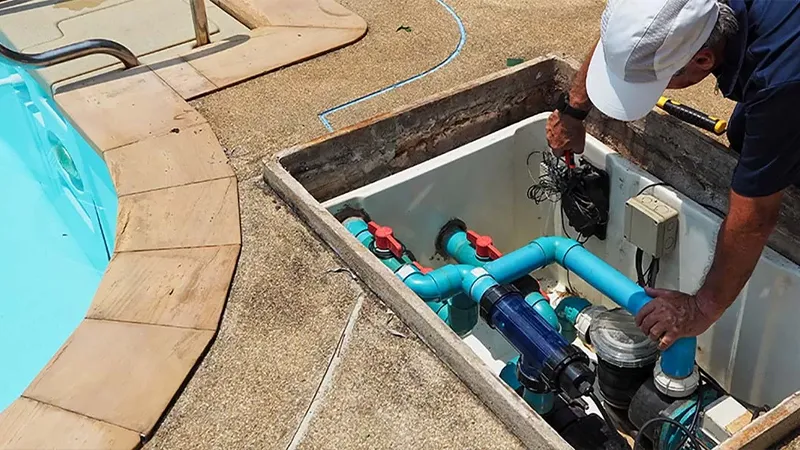
Pool Pump Capacitor Failure
- If your pump isn’t starting up like it should, listen closely. If you hear a faint buzzing or a quiet hum coming from your pool pump, that’s a sure sign that the capacitor has gone kaput.
- Pool pump capacitors usually last around 5,000 starts. Now, that might sound like a big number, but it can fly by quicker than you think. So, think back to when you first got your pump and make a rough estimate. If you only use your pump once a day, that’s roughly 10-13 years of life. But if you’re running it twice daily, then it might last around 5-6 years. Also, if you have a sand filter, remember to consider backwashing since it involves multiple start-stop cycles for your pump.
- This one’s a bit more hands-on. If your pump isn’t humming, there’s no burnt smell, and it’s relatively new, then it’s time for a closer look. Pop open your pump and check for any deformities in the capacitor. If it’s starting to bulge like a balloon (or any battery for that matter), then it’s definitely time to swap it out.
Fan Capacitor Failure Symptoms
- Clicking Noise: If you hear a clicking noise when your furnace tries to start but the blower doesn’t kick in, it could signal a capacitor issue. Turn off the thermostat and call a professional HVAC contractor for inspection.
- Burning Smell: A burning smell near the furnace vents indicates electrical problems. Turn off the furnace and the breaker to prevent further damage, then get professional help.
- Humming Sound: A humming sound from the blower motor suggests the capacitor can’t provide enough power. This might lead to motor issues or circuit breaker trips.
- No Power: If the blower motor doesn’t start at all, check the circuit breaker and furnace power switch. If there’s no power, call an HVAC contractor.
- Erratic Motor Operation: A bad capacitor can cause the blower motor to run slower, overheat, or cycle irregularly.
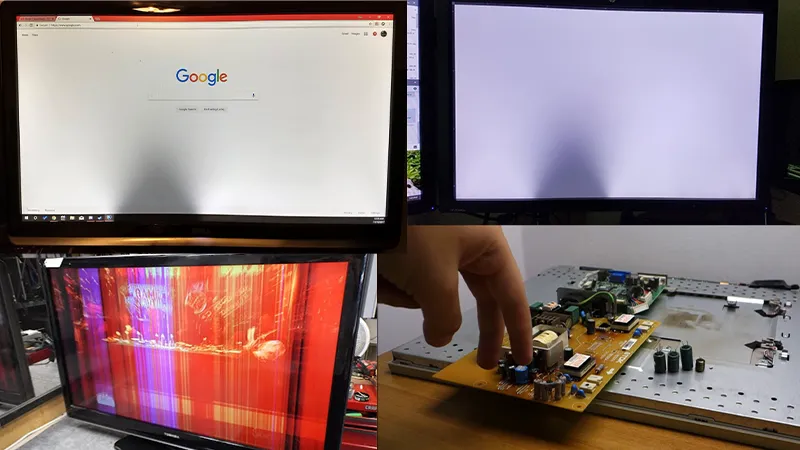
Lcd Monitor Capacitor Failure Symptoms
When a capacitor in an LCD monitor goes bad, you might notice:
- Screen Flickering: The screen might flicker on and off because the capacitor can’t keep a steady electrical charge.
- Screen Freezing or Stuttering: You might see the screen freeze or show videos in a choppy way.
- Dim Display: The screen could be dimmer than usual because the capacitor can’t give consistent power to the backlight.
- No Display: Sometimes, the monitor won’t show anything at all because of a faulty capacitor.
- Lines or Distortions: You might spot lines or weird patterns on the screen, indicating a bad capacitor.
- Monitor Not Turning On: If the capacitor that powers up the monitor is bad, the monitor won’t turn on when you press the power button.
Motherboard Capacitor Failure Symptoms
If your laptop is slower than usual, freezes, or won’t start, it might have a failed capacitor on the motherboard. Failed capacitors can cause various issues, including sudden shutdowns. Look for bulging or leaking capacitors as signs of failure. If your computer’s stability worsens over time, a failed capacitor could be the culprit.
Ceramic Capacitor Failure
- Overvoltage: Exposing ceramic capacitors to voltages higher than their rated limits can cause them to fail. This can happen due to voltage spikes, improper circuit design, or electrical surges.
- Thermal Stress: Rapid temperature changes or prolonged exposure to high temperatures can stress ceramic capacitors, leading to failure. Thermal cycling can cause internal cracks or delamination, compromising the capacitor’s integrity.
- Mechanical Stress: Mechanical shocks, vibrations, or improper handling during installation or maintenance can damage ceramic capacitors, resulting in failure.
- Humidity and Contaminants: Ceramic capacitors are sensitive to moisture and contaminants. Exposure to high humidity or chemicals can degrade the insulation or compromise the capacitor’s dielectric properties, leading to failure.
- Ageing: Like all electronic components, ceramic capacitors degrade over time. This can be due to factors such as material aging, internal corrosion, or gradual breakdown of dielectric properties, resulting in reduced performance or failure.
- Manufacturing Defects: Ceramic capacitors may have manufacturing defects such as poor soldering, internal cracks, or material inconsistencies, which can lead to premature failure.
- Voltage Transients: High-frequency voltage transients or noise in the circuit can stress ceramic capacitors, especially if they are not designed to handle such conditions. This can lead to electrical overstress and eventual failure.
- Electrostatic Discharge (ESD): ESD events can damage ceramic capacitors, particularly if they are not adequately protected or if the circuit lacks proper ESD mitigation measures.
FAQ
Why Does My Capacitor Keep Going Bad?
If your capacitor keeps failing repeatedly, several factors could be contributing to this issue:
Overloading or Overcurrent: Continuous exposure to currents or voltages exceeding the capacitor’s rated capacity can lead to overheating and eventual failure. Ensure you’re using capacitors with appropriate ratings and avoid operating them beyond their limits.
Environmental Factors: Extreme temperatures, high humidity, or exposure to chemicals can damage the insulation or internal components of the capacitor, causing it to malfunction. Install capacitors in dry, stable environments and shield them from harsh conditions.
Circuit Design Issues: Incorrect wiring, insufficient overvoltage protection, or improper voltage regulation in the circuit can stress capacitors and lead to failures. Verify that your circuit design meets specifications and follow correct installation and connection procedures.
Why Are Capacitors Important?
- Energy Storage: They store and release electrical energy, stabilizing the power supply.
- Energy Storage: They store and release electrical energy, stabilizing the power supply.
- Filtering Noise: They reduce high-frequency interference, improving signal quality.
- Power Factor Correction: They enhance energy efficiency and reduce wastage.
- Circuit Stability: They ensure stable operation and protect electronic devices.
Why Capacitor Bank Rating in Kvar?
The rated capacity of a capacitor bank is typically measured in kilovolt-ampere reactive (kVAR) units, indicating the bank’s reactive power capacity.
Determining the appropriate capacitor bank rating requires considering system loads, power factor requirements, and grid characteristics to ensure system stability and efficiency.
Can a Capacitor Fail Intermittently?
Yes, capacitors can fail intermittently. Intermittent capacitor failure can occur due to various reasons:
- Internal Faults: Capacitors can develop internal faults such as insulation breakdown, dielectric degradation, or electrode corrosion. These faults may not manifest consistently but can cause intermittent failures.
- Environmental Factors: Extreme temperatures, humidity fluctuations, and exposure to contaminants can contribute to intermittent capacitor failures. Environmental stresses can weaken capacitor components over time, leading to sporadic malfunctions.
- Mechanical Stress: Physical shocks, vibrations, or improper handling during installation or maintenance can damage capacitors internally, resulting in intermittent failures.
- Aging and Wear: As capacitors age, their performance may degrade, leading to intermittent failures. Electrolytic capacitors, in particular, are prone to aging-related issues like electrolyte drying, which can cause intermittent faults.
- Manufacturing Defects: Capacitors with manufacturing defects or quality issues may exhibit intermittent failures. These defects can include poor soldering, weak internal connections, or material inconsistencies.
- Voltage and Current Fluctuations: Rapid changes in voltage or current levels, such as voltage spikes or fluctuations in power supply, can stress capacitors and contribute to intermittent failures.
What Causes A Capacitor to Fail on an AC Unit?
Yes, capacitors can fail intermittently. Intermittent capacitor failure can occur due to various reasons:
- Internal Faults: Capacitors can develop internal faults such as insulation breakdown, dielectric degradation, or electrode corrosion. These faults may not manifest consistently but can cause intermittent failures.
- Environmental Factors: Extreme temperatures, humidity fluctuations, and exposure to contaminants can contribute to intermittent capacitor failures. Environmental stresses can weaken capacitor components over time, leading to sporadic malfunctions.
- Mechanical Stress: Physical shocks, vibrations, or improper handling during installation or maintenance can damage capacitors internally, resulting in intermittent failures.
- Aging and Wear: As capacitors age, their performance may degrade, leading to intermittent failures. Electrolytic capacitors, in particular, are prone to aging-related issues like electrolyte drying, which can cause intermittent faults.
- Manufacturing Defects: Capacitors with manufacturing defects or quality issues may exhibit intermittent failures. These defects can include poor soldering, weak internal connections, or material inconsistencies.
- Voltage and Current Fluctuations: Rapid changes in voltage or current levels, such as voltage spikes or fluctuations in power supply, can stress capacitors and contribute to intermittent failures.











